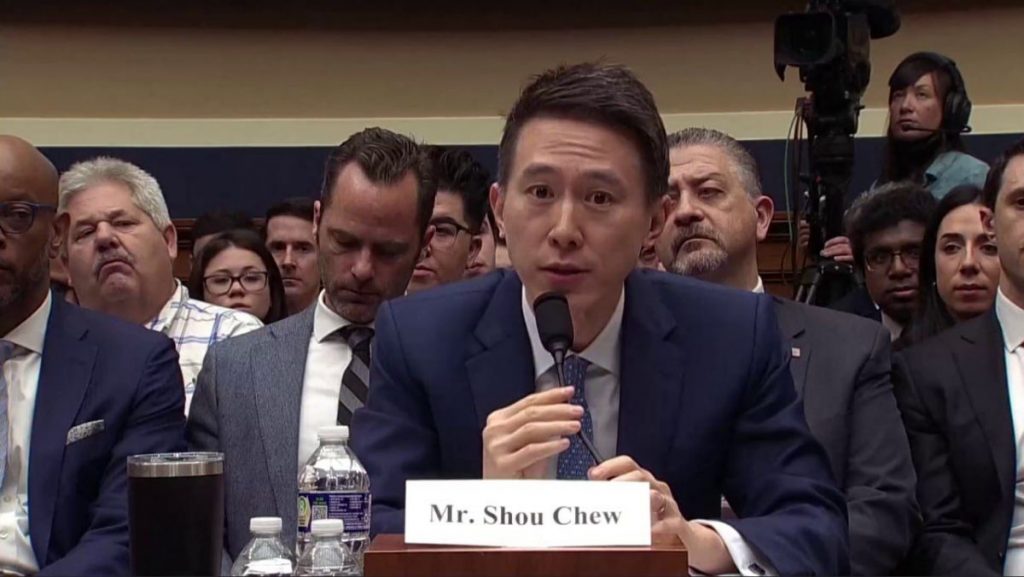TikTok CEO Stammers at U.S. Congress Hearing Over Chinese Government’s Censorship and Political Bias

In Brief
The US Congress hearing revealed that ByteDance is subject to the Chinese government’s censorship and surveillance laws, which could compromise the privacy and security of its users’ data.
A five-hour US Congress hearing ended up being a nightmare for TikTok’s CEO Show Chu, as he stammered and avoided answering questions. When asked if he had spoken to anyone from China prior to the hearing, he was unable to respond. The hearing also revealed that TikTok’s moderation policies were inconsistent, with some content being flagged and removed while other similar content was allowed to remain on the platform. This raised concerns about the potential for censorship and political bias on the app.

Early in the hearing, Chu stated that “ByteDance is neither owned or controlled by the Chinese authorities.” This is patently untrue since ByteDance’s headquarters are in Beijing, and it is de facto under the supervision of the Chinese government. If you don’t follow the instructions, you vanish. Ask Jack Ma, the man behind AliExpress.
Therefore, it is highly likely that ByteDance is subject to the Chinese government’s censorship and surveillance laws, which could potentially compromise the privacy and security of its users’ data. This raises concerns about the company’s ability to operate independently and without interference from the Chinese authorities.
The results of these hearings proved what many people had long suspected: Show Chu is not TikTok’s CEO. The individual who created and developed TikTok departed the firm in 2021, and so he is merely a puppet and acts as the avatar of the platform’s current leadership as he doesn’t know critical details about the business. However, Show Chu’s involvement in TikTok’s early success cannot be ignored, as he played a significant role in the app’s growth and popularity. Despite not being the current CEO, his contributions to the platform should be acknowledged.
I want to call attention to the passage where Show Chu effectively rejected the congressman in order to defend the CEO of TikTok.
The American establishment wants people to believe that Silicon Valley’s big tech is trustworthy, protects consumers, and never divulges private information. However, the privacy and security of users’ data are not strengths of American social networks. Just think of Facebook and the Cambridge Analytica debacle.
If TikTok hadn’t surpassed all American social networks in terms of popularity and growth rates, this hearing would not take place. Banning TikTok would definitely make the lives of Mark Zuckerberg and Sundar Pichai easier. In this case, digital protectionism hides behind a faked concern about the data of underprivileged Americans.
- China has been known to censor the internet and control what its citizens can see and do online. The latest example is WeChat banning ChatGPT, a chatbot created to help people access information the government may not want them to see.
- Since early November, the Chinese authorities have been ramping up their persecution of ChatGPT, a chatbot used by Tencent Holdings and Ant Group, after it was revealed that it had been used to spread true information in certain areas of the country. They have banned companies from using ChatGPT in any form on their platforms to “protect” citizens from receiving “false” information and manipulating public opinion.
- In December, the Chinese government issued a new guideline banning the creation of AI-generated images without watermarks or other obvious labels. The guideline states that unethical people use AI to produce, copy, publish, and disseminate illegal and harmful information, to slander and belittle the reputation and honor of others, and to fake other people’s identities.
Read more related articles:
Disclaimer
In line with the Trust Project guidelines, please note that the information provided on this page is not intended to be and should not be interpreted as legal, tax, investment, financial, or any other form of advice. It is important to only invest what you can afford to lose and to seek independent financial advice if you have any doubts. For further information, we suggest referring to the terms and conditions as well as the help and support pages provided by the issuer or advertiser. MetaversePost is committed to accurate, unbiased reporting, but market conditions are subject to change without notice.
About The Author
Damir is the team leader, product manager, and editor at Metaverse Post, covering topics such as AI/ML, AGI, LLMs, Metaverse, and Web3-related fields. His articles attract a massive audience of over a million users every month. He appears to be an expert with 10 years of experience in SEO and digital marketing. Damir has been mentioned in Mashable, Wired, Cointelegraph, The New Yorker, Inside.com, Entrepreneur, BeInCrypto, and other publications. He travels between the UAE, Turkey, Russia, and the CIS as a digital nomad. Damir earned a bachelor's degree in physics, which he believes has given him the critical thinking skills needed to be successful in the ever-changing landscape of the internet.
More articles

Damir is the team leader, product manager, and editor at Metaverse Post, covering topics such as AI/ML, AGI, LLMs, Metaverse, and Web3-related fields. His articles attract a massive audience of over a million users every month. He appears to be an expert with 10 years of experience in SEO and digital marketing. Damir has been mentioned in Mashable, Wired, Cointelegraph, The New Yorker, Inside.com, Entrepreneur, BeInCrypto, and other publications. He travels between the UAE, Turkey, Russia, and the CIS as a digital nomad. Damir earned a bachelor's degree in physics, which he believes has given him the critical thinking skills needed to be successful in the ever-changing landscape of the internet.



















































